被动语态总结
- 格式:doc
- 大小:57.00 KB
- 文档页数:2
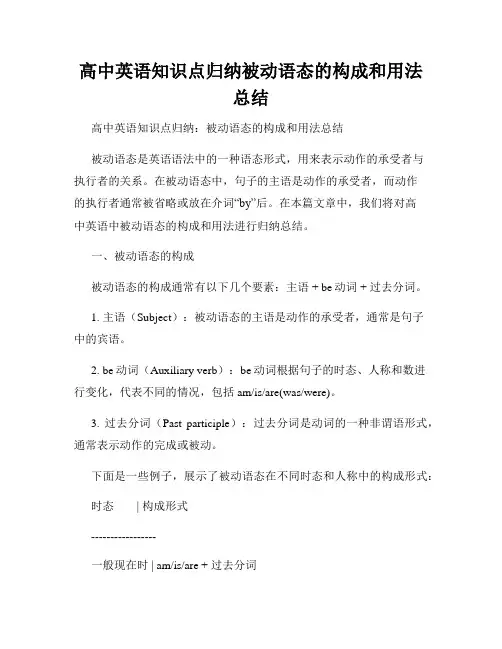
高中英语知识点归纳被动语态的构成和用法总结高中英语知识点归纳:被动语态的构成和用法总结被动语态是英语语法中的一种语态形式,用来表示动作的承受者与执行者的关系。
在被动语态中,句子的主语是动作的承受者,而动作的执行者通常被省略或放在介词“by”后。
在本篇文章中,我们将对高中英语中被动语态的构成和用法进行归纳总结。
一、被动语态的构成被动语态的构成通常有以下几个要素:主语 + be动词 + 过去分词。
1. 主语(Subject):被动语态的主语是动作的承受者,通常是句子中的宾语。
2. be动词(Auxiliary verb):be动词根据句子的时态、人称和数进行变化,代表不同的情况,包括am/is/are(was/were)。
3. 过去分词(Past participle):过去分词是动词的一种非谓语形式,通常表示动作的完成或被动。
下面是一些例子,展示了被动语态在不同时态和人称中的构成形式:时态 | 构成形式-----------------一般现在时 | am/is/are + 过去分词一般过去时 | was/were + 过去分词一般将来时 | will be + 过去分词现在进行时 | am/is/are + being + 过去分词过去进行时 | was/were + being + 过去分词现在完成时 | have/has been + 过去分词过去完成时 | had been + 过去分词二、被动语态的用法被动语态在英语中有着广泛的应用。
以下是几种常见的使用情况:1. 强调动作的承受者:被动语态可以突出句子中动作的承受者,使其成为句子的主要焦点。
例如:- The house was destroyed by the earthquake.(房子被地震摧毁了。
) - The book was written by a famous author.(这本书是由一位著名作家写的。
)2. 描述客观事实:当注重描述客观事实时,被动语态可以更加准确地传达信息。
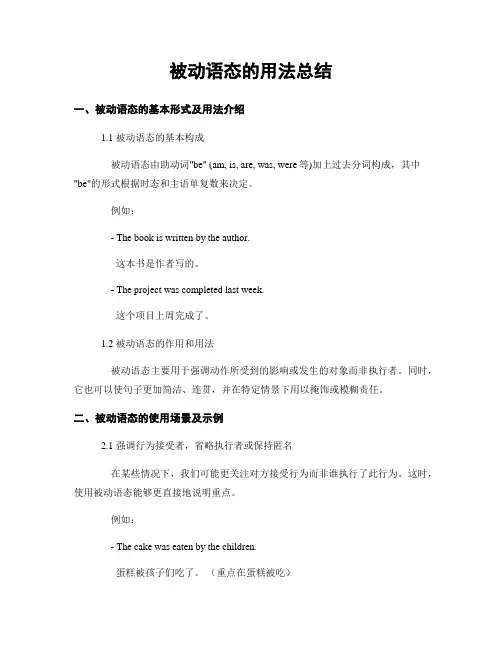
被动语态的用法总结一、被动语态的基本形式及用法介绍1.1 被动语态的基本构成被动语态由助动词"be" (am, is, are, was, were等)加上过去分词构成,其中"be"的形式根据时态和主语单复数来决定。
例如:- The book is written by the author.这本书是作者写的。
- The project was completed last week.这个项目上周完成了。
1.2 被动语态的作用和用法被动语态主要用于强调动作所受到的影响或发生的对象而非执行者。
同时,它也可以使句子更加简洁、连贯,并在特定情景下用以掩饰或模糊责任。
二、被动语态的使用场景及示例2.1 强调行为接受者,省略执行者或保持匿名在某些情况下,我们可能更关注对方接受行为而非谁执行了此行为。
这时,使用被动语态能够更直接地说明重点。
例如:- The cake was eaten by the children.蛋糕被孩子们吃了。
(重点在蛋糕被吃)- The window was broken by someone.窗户被人打破了。
(重点在窗户被打破)2.2 表示普遍真理或客观事实时当我们表达一般性的真理或客观事实时,使用被动语态会更常见。
例如:- English is spoken in many countries around the world.英语在世界上很多国家都是通用的。
2.3 避免指责或模糊责任在某些情况下,使用主动语态可能会显得过于直接或指责性强。
此时,使用被动语态可以减轻对他人的压力,模糊责任。
例如:- Mistakes were made that led to the project's failure.导致项目失败的错误已经发生了。
(不直接指明谁犯了错误)三、注意事项和应避免的误区3.1 注意及时提供执行者信息虽然被动语态可以省略执行者信息,但为了保持句子完整和明确,应该在适当的情况下提供执行者的相关信息。
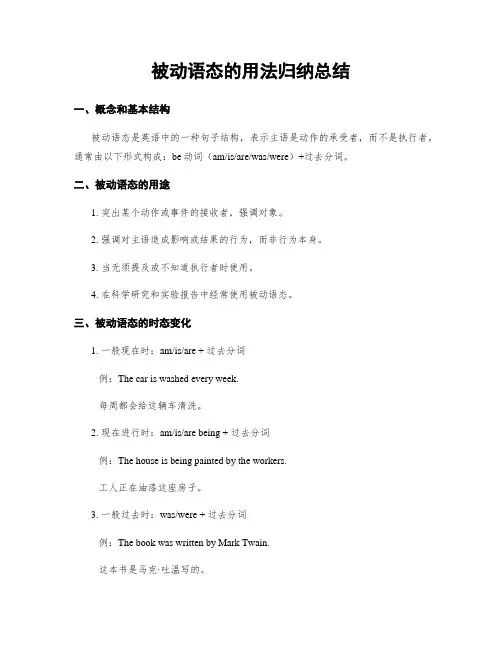
被动语态的用法归纳总结一、概念和基本结构被动语态是英语中的一种句子结构,表示主语是动作的承受者,而不是执行者。
通常由以下形式构成:be动词(am/is/are/was/were)+过去分词。
二、被动语态的用途1. 突出某个动作或事件的接收者,强调对象。
2. 强调对主语造成影响或结果的行为,而非行为本身。
3. 当无须提及或不知道执行者时使用。
4. 在科学研究和实验报告中经常使用被动语态。
三、被动语态的时态变化1. 一般现在时:am/is/are + 过去分词例:The car is washed every week.每周都会给这辆车清洗。
2. 现在进行时:am/is/are being + 过去分词例:The house is being painted by the workers.工人正在油漆这座房子。
3. 一般过去时:was/were + 过去分词例:The book was written by Mark Twain.这本书是马克·吐温写的。
4. 过去进行时:was/were being + 过去分词例:The crops were being harvested when the storm hit.暴风雨袭击时农作物正在收割。
5. 一般将来时:will be + 过去分词例:The package will be delivered tomorrow.这个包裹明天将被送到。
6. 现在完成时:has/have been + 过去分词例:The problem has been solved by our team.这个问题已经被我们的团队解决了。
四、主动语态和被动语态的转换1. 主动语态变被动语态把主动句的宾语移到前面作为被动句的主语,谓语动词改为相应形式的be动词,原主语成为介词by后的短语(可省略)。
例:Active: They built a new bridge last year.被动:A new bridge was built by them last year.2. 被动语态变主动语态将被动句的主语转化为主格作为主句的主语,谓语使用与原句中be表达时态、人称和数一致的动词原形。
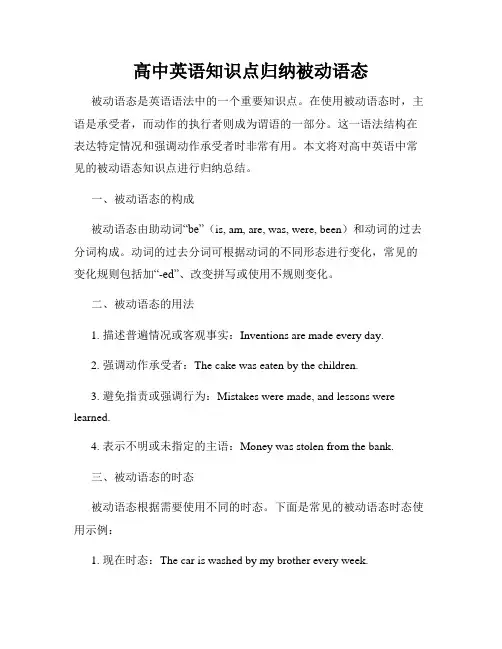
高中英语知识点归纳被动语态被动语态是英语语法中的一个重要知识点。
在使用被动语态时,主语是承受者,而动作的执行者则成为谓语的一部分。
这一语法结构在表达特定情况和强调动作承受者时非常有用。
本文将对高中英语中常见的被动语态知识点进行归纳总结。
一、被动语态的构成被动语态由助动词“be”(is, am, are, was, were, been)和动词的过去分词构成。
动词的过去分词可根据动词的不同形态进行变化,常见的变化规则包括加“-ed”、改变拼写或使用不规则变化。
二、被动语态的用法1. 描述普遍情况或客观事实:Inventions are made every day.2. 强调动作承受者:The cake was eaten by the children.3. 避免指责或强调行为:Mistakes were made, and lessons were learned.4. 表示不明或未指定的主语:Money was stolen from the bank.三、被动语态的时态被动语态根据需要使用不同的时态。
下面是常见的被动语态时态使用示例:1. 现在时态:The car is washed by my brother every week.2. 过去时态:The letter was sent yesterday.3. 将来时态:The contract will be signed next week.4. 现在进行时态:The house is being built by a group of workers.5. 现在完成时态:The book has been read by many people.四、被动语态与不定式、情态动词的使用1. 被动语态与不定式:The house needs to be repaired.2. 被动语态与情态动词:The project should be completed by tomorrow.五、被动语态的特殊情况1. 特殊疑问句:Where was the bag found?2. 感叹句:How beautifully the song was sung by the singer!3. 含有两个宾语的句子:We were given a gift by our friends.六、被动语态中的常见错误1. 错误的主语:The book is written by Shakespeare.(改为“The book was written by Shakespeare.”)2. 错误的时态:The photos were taken by me last weekend.(改为“The photos have been taken by me.”)通过对高中英语被动语态知识点的归纳总结,我们可以更好地理解和应用被动语态。
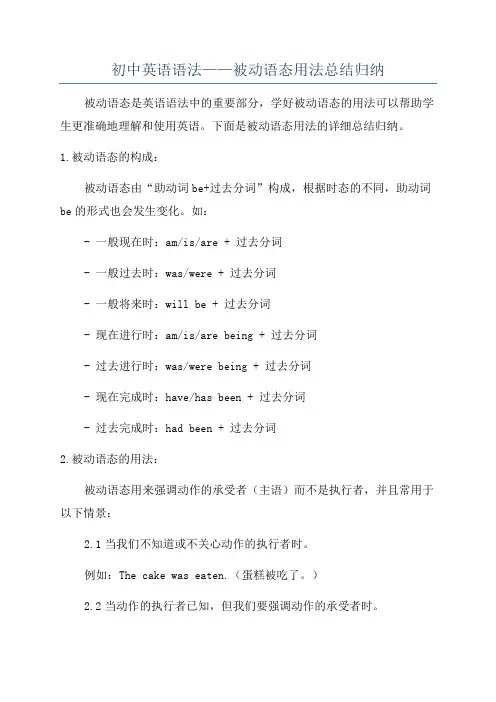
初中英语语法——被动语态用法总结归纳被动语态是英语语法中的重要部分,学好被动语态的用法可以帮助学生更准确地理解和使用英语。
下面是被动语态用法的详细总结归纳。
1.被动语态的构成:被动语态由“助动词be+过去分词”构成,根据时态的不同,助动词be的形式也会发生变化。
如:- 一般现在时:am/is/are + 过去分词- 一般过去时:was/were + 过去分词- 一般将来时:will be + 过去分词- 现在进行时:am/is/are being + 过去分词- 过去进行时:was/were being + 过去分词- 现在完成时:have/has been + 过去分词- 过去完成时:had been + 过去分词2.被动语态的用法:被动语态用来强调动作的承受者(主语)而不是执行者,并且常用于以下情景:2.1当我们不知道或不关心动作的执行者时。
例如:The cake was eaten.(蛋糕被吃了。
)2.2当动作的执行者已知,但我们要强调动作的承受者时。
例如:The house was built by my grandfather.(这座房子是我爷爷建的。
)2.3当我们要避免使用第一人称或第二人称时。
例如:Mistakes were made.(犯了错误。
)3.被动语态的注意事项:在使用被动语态时,需要注意以下几点:3.1表示动作的动词要用过去分词形式。
过去分词的形式有规律变化和不规律变化两种。
如:- 规律变化:原形 + ed,例如:played, watched, called- 不规律变化:需要记忆,例如:born, written, eaten3.2被动句的主语是动作的承受者,通常出现在句子的前面。
如:- 主动语态:I cooked dinner.(我做了晚饭。
)- 被动语态:Dinner was cooked by me.(晚饭是我做的。
)3.3 不及物动词不能构成被动语态。
不及物动词没有宾语,因此不能强调动作的承受者。
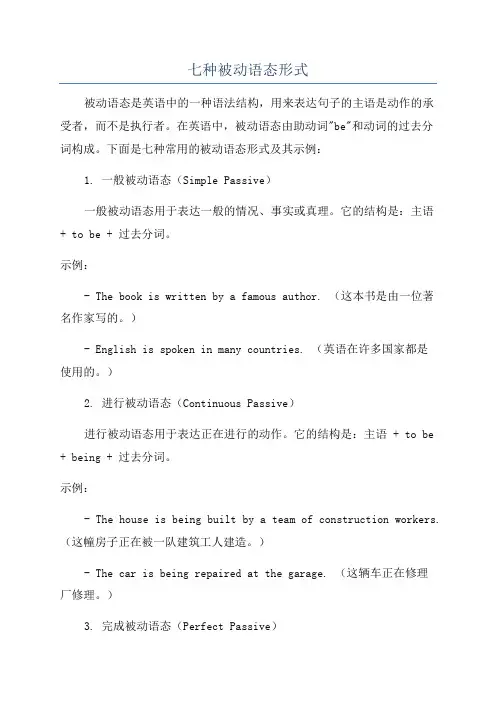
七种被动语态形式被动语态是英语中的一种语法结构,用来表达句子的主语是动作的承受者,而不是执行者。
在英语中,被动语态由助动词"be"和动词的过去分词构成。
下面是七种常用的被动语态形式及其示例:1. 一般被动语态(Simple Passive)一般被动语态用于表达一般的情况、事实或真理。
它的结构是:主语+ to be + 过去分词。
示例:- The book is written by a famous author. (这本书是由一位著名作家写的。
)- English is spoken in many countries. (英语在许多国家都是使用的。
)2. 进行被动语态(Continuous Passive)进行被动语态用于表达正在进行的动作。
它的结构是:主语 + to be + being + 过去分词。
示例:- The house is being built by a team of construction workers. (这幢房子正在被一队建筑工人建造。
)- The car is being repaired at the garage. (这辆车正在修理厂修理。
)3. 完成被动语态(Perfect Passive)完成被动语态用于表达已经完成的动作。
它的结构是:主语 + to have been + 过去分词。
示例:- The cake has been eaten by all the guests. (这个蛋糕已经被所有的客人吃掉了。
)4. 一般完成被动语态(Simple Perfect Passive)一般完成被动语态用于表达已经完成的一般情况、事实或真理。
它的结构是:主语 + to have been + 过去分词。
示例:- The job offer has been rejected by many applicants. (这个工作邀请已经被许多申请人拒绝了。
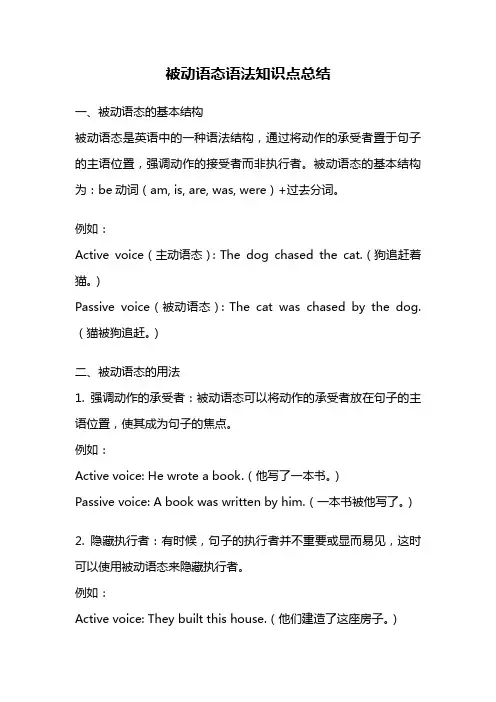
被动语态语法知识点总结一、被动语态的基本结构被动语态是英语中的一种语法结构,通过将动作的承受者置于句子的主语位置,强调动作的接受者而非执行者。
被动语态的基本结构为:be动词(am, is, are, was, were)+过去分词。
例如:Active voice(主动语态):The dog chased the cat.(狗追赶着猫。
)Passive voice(被动语态):The cat was chased by the dog.(猫被狗追赶。
)二、被动语态的用法1. 强调动作的承受者:被动语态可以将动作的承受者放在句子的主语位置,使其成为句子的焦点。
例如:Active voice: He wrote a book.(他写了一本书。
)Passive voice: A book was written by him.(一本书被他写了。
)2. 隐藏执行者:有时候,句子的执行者并不重要或显而易见,这时可以使用被动语态来隐藏执行者。
例如:Active voice: They built this house.(他们建造了这座房子。
)Passive voice: This house was built by them.(这座房子被他们建造了。
)3. 表示客观事实:被动语态常用于描述客观事实或一般真理。
例如:Active voice: People speak English all over the world.(全世界人们讲英语。
)Passive voice: English is spoken all over the world.(英语在全世界都被讲。
)4. 句子的主语是动作的承受者:当动作的承受者比执行者更重要时,可以使用被动语态将其放在句子的主语位置。
例如:Active voice: The car hit the tree.(汽车撞到了树。
)Passive voice: The tree was hit by the car.(树被汽车撞到了。

初中英语语法——被动语态用法总结归纳被动语态是英语语法中的一种重要的句型结构,用来表示主语是动作的承受者,或者是主语被动地接受了其中一种行为或影响。
在被动语态中,动作的执行者通常不被说明,而动作的接受者(主语)成为句子的重点。
被动语态的结构是:“be”动词的适当形式 + 过去分词被动语态的时态、语态和主动语态一样,即可以变换时态(一般现在时、一般过去时、一般将来时等)和语态(进行时、完成时等)。
下面对被动语态的几个方面进行总结归纳。
1.一般现在时被动语态:一般现在时被动语态的结构是:“am/is/are”(be动词的适当形式)+ 过去分词例如:- 主动语态:They make cars.- 被动语态:Cars are made by them.2.一般过去时被动语态:一般过去时被动语态的结构是:“was/were”(be动词的适当形式)+ 过去分词例如:- 主动语态:She cooked dinner.- 被动语态:Dinner was cooked by her.3.一般将来时被动语态:一般将来时被动语态的结构是:“will be”(be动词的适当形式)+ 过去分词例如:- 主动语态:You will clean the room.- 被动语态:The room will be cleaned by you.4.进行时被动语态:进行时被动语态的结构是:“am/is/are being”(be动词的适当形式)+ 过去分词例如:- 主动语态:They are painting the wall.- 被动语态:The wall is being painted by them.5.完成时被动语态:完成时被动语态的结构是:“has/have been”(be动词的适当形式)+ 过去分词例如:- 主动语态:She has written a book.- 被动语态:A book has been written by her.需要注意的是,被动语态的主语通常不是动作的执行者,所以经常用于下面几种情况:-当动作的执行者不得而知或不重要时,使用被动语态。
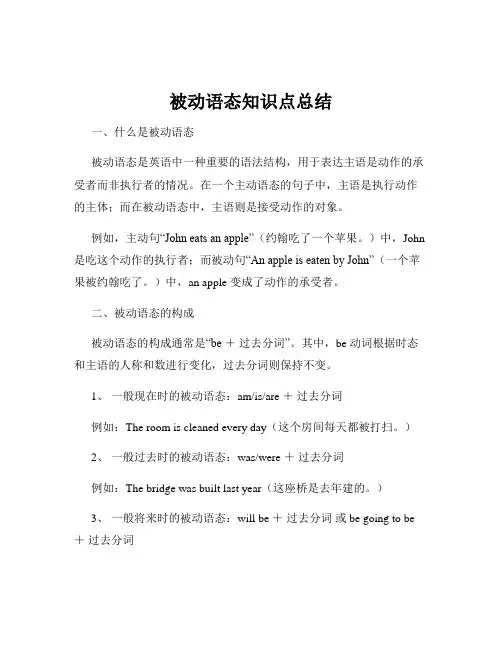
被动语态知识点总结一、什么是被动语态被动语态是英语中一种重要的语法结构,用于表达主语是动作的承受者而非执行者的情况。
在一个主动语态的句子中,主语是执行动作的主体;而在被动语态中,主语则是接受动作的对象。
例如,主动句“John eats an apple”(约翰吃了一个苹果。
)中,John 是吃这个动作的执行者;而被动句“An apple is eaten by John”(一个苹果被约翰吃了。
)中,an apple 变成了动作的承受者。
二、被动语态的构成被动语态的构成通常是“be +过去分词”。
其中,be 动词根据时态和主语的人称和数进行变化,过去分词则保持不变。
1、一般现在时的被动语态:am/is/are +过去分词例如:The room is cleaned every day(这个房间每天都被打扫。
)2、一般过去时的被动语态:was/were +过去分词例如:The bridge was built last year(这座桥是去年建的。
)3、一般将来时的被动语态:will be +过去分词或 be going to be +过去分词例如:The sports meeting will be held next week(运动会将在下周举行。
)The party is going to be organized by them(聚会将由他们组织。
)4、现在进行时的被动语态:am/is/are + being +过去分词例如:The problem is being discussed now(这个问题正在被讨论。
)5、过去进行时的被动语态:was/were + being +过去分词例如:The machine was being repaired at that time(那时候机器正在被修理。
)6、现在完成时的被动语态:have/has been +过去分词例如:The work has been finished(工作已经完成了。
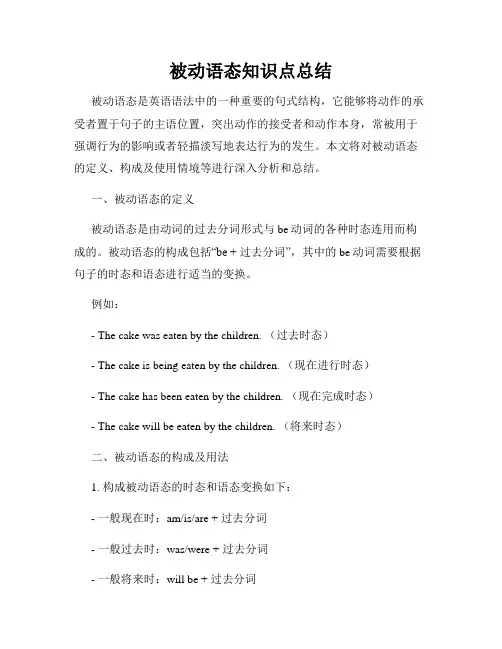
被动语态知识点总结被动语态是英语语法中的一种重要的句式结构,它能够将动作的承受者置于句子的主语位置,突出动作的接受者和动作本身,常被用于强调行为的影响或者轻描淡写地表达行为的发生。
本文将对被动语态的定义、构成及使用情境等进行深入分析和总结。
一、被动语态的定义被动语态是由动词的过去分词形式与be动词的各种时态连用而构成的。
被动语态的构成包括“be + 过去分词”,其中的be动词需要根据句子的时态和语态进行适当的变换。
例如:- The cake was eaten by the children. (过去时态)- The cake is being eaten by the children. (现在进行时态)- The cake has been eaten by the children. (现在完成时态)- The cake will be eaten by the children. (将来时态)二、被动语态的构成及用法1. 构成被动语态的时态和语态变换如下:- 一般现在时:am/is/are + 过去分词- 一般过去时:was/were + 过去分词- 一般将来时:will be + 过去分词- 现在进行时:am/is/are being + 过去分词- 过去进行时:was/were being + 过去分词- 现在完成时:have/has been + 过去分词- 过去完成时:had been + 过去分词- 情态动词应用:情态动词 + be + 过去分词2. 使用被动语态时需要注意以下几点:- 强调行为接受者:被动语态能够将行为接受者提前置于句子的主语位置,使其成为句子的焦点,而不强调行为的执行者。
例如:- The letter was written by Tom.(行为接受者为主语)- Tom wrote the letter.(行为执行者为主语)- 段落连贯性的考虑:在段落中使用被动语态能够更好地保持句子之间的连贯性,避免过多使用主动语态而显得单调。
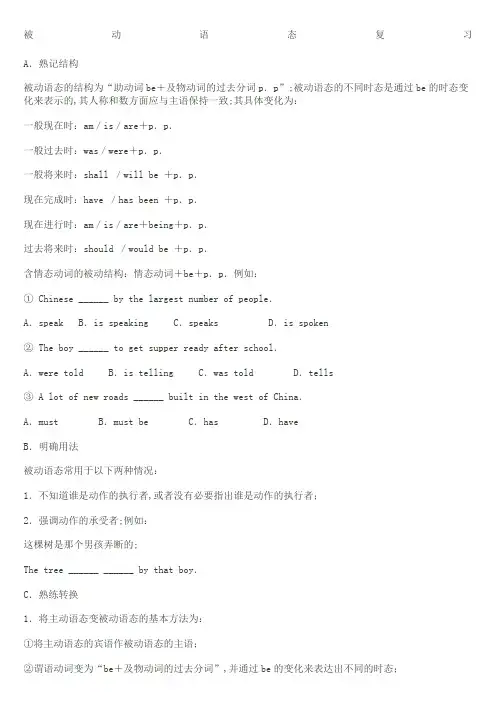
被动语态复习A.熟记结构被动语态的结构为“助动词be+及物动词的过去分词p.p”;被动语态的不同时态是通过be的时态变化来表示的,其人称和数方面应与主语保持一致;其具体变化为:一般现在时:am/is/are+p.p.一般过去时:was/were+p.p.一般将来时:shall /will be +p.p.现在完成时:have /has been +p.p.现在进行时:am/is/are+being+p.p.过去将来时:should /would be +p.p.含情态动词的被动结构:情态动词+be+p.p.例如:① Chinese ______ by the largest number of people.A.speak B.is speaking C.speaks D.is spoken② The boy ______ to get supper ready after school.A.were told B.is telling C.was told D.tells③ A lot of new roads ______ built in the west of China.A.must B.must be C.has D.haveB.明确用法被动语态常用于以下两种情况:1.不知道谁是动作的执行者,或者没有必要指出谁是动作的执行者;2.强调动作的承受者;例如:这棵树是那个男孩弄断的;The tree ______ ______ by that boy.C.熟练转换1.将主动语态变被动语态的基本方法为:①将主动语态的宾语作被动语态的主语;②谓语动词变为“be+及物动词的过去分词”,并通过be的变化来表达出不同的时态;③主动语态的主语变为介词by的宾语,组成介词短语放在被动结构中的谓语动词之后;有时by短语可以省略;2.被动语态的一般疑问句是将一个助动词置于主语之前;否定句是在第一个助动词后加not;特殊疑问句的语序为:疑问词+一般疑问句;例如:① You must throw the broken pottery away at once.The broken pottery ______ ______ ______ ______ at once.同义句② Where did they grow vegetables改为被动语态Where ______ vegetables ______D.注意特例将主动语态变被动语态应注意几个特殊情况:1.含双宾语的主动结构变为被动结构时,有两种方法:①将间接宾语变为主语,直接宾语保持不变;②将直接宾语变为主语,间接宾语用介词to或for引导;例如:① He told us a story.变被动语态→We were told a storyby him.或:A story was told to us by him.② Her mother gave her a new pen.变被动语态A new pen ______ ______ ______ her by her mother.2.短语动词的被动语态:在变为被动语态时,要将短语动词视为一个整体,其后的介词或副词不能省去;例如:① This dictionary mustn't ______ from the library.A.take away B.taken away C.are taken away D.be taken away② She will take good care of the children.变被动语态The children will ______ ______ ______ ______ ______ by her.3.含有复合宾语的主动结构变被动结构时,通常将宾语变为被动句的主语,而宾语补足语就成为主语补足语;注意:省略to的不定式作宾补时,不定式符号to必须补上;例如:Someone saw him swim in Qianling Lake yesterday.变被动He ______ ______ ______ swim in Qianling Lake yesterday.4.不定式的被动结构:动词不定式的被动语态为“to be +过去分词”;例如:The radio says a wild animal zoo is to ______ in our city.A.be building B.build C.be built D.built5.以疑问代词开头的疑问句转换成被动句时要注意词序:应将主动句中的疑问代词改为介词by的宾语,但仍然放在句子开头;例如:Who has broken the cup改为被动语态→By whom has the cup been brokenE.注意区别被动语态和过去分词作表语的区别:1含义不同:被动语态强调动作,重点说明动作由谁完成、怎样完成;而过去分词作表语通常用来描写情景,叙述人或事物的特征及所处的状态;试比较:The window is broken.窗子破了;系表结构The window is broken by him.窗子被他打破了;被动语态2用法不同:过去分词作表语时可以被 so,very,too等程度副词修饰,而被动语态则不能用so,very,too 修饰,而需用much,very much,so much,too much修饰;试比较:He was very interested in science.他对科学有极大兴趣;系表结构I was so much surprised at the scene that I didn't know what to do.我被那种场面搞得大吃一惊,不知所措;被动语态F.牢记相关句型教材中与被动语态相关的句型有:1.be covered with被……覆盖2.be made of由……制作发生物理变化 be made from由……制作发生化学变化be made in由某地制造 be made by被某人制造3.be used for被用来…… be used as被当作作为……来使用 be used to do sth.被用来做某事4.It is said that...据说…… It is hoped that...希望…… It is well known that...众所周知……例如:①—Your coat looks nice.Is it ______ cotton —Yes.It's _________Shanghai.A.made of;made by B.made of;made in C.made for;made by D.made for;made in② This machine is used ______ the room w et.A.for keeping B.as keeping C.keep D.to keeping③ 据说在南京长江上又在建一座桥;______ ______ ______ that ______ ______ is being ______ over the Changjiang River in Nanjing.几种特殊的被动语态1. 带不定式的被动语态;The child is sure to be punished for that. 那个孩子肯定会因为那件事受罚的;2. 带介词的动词短语的被动语态;Such a thing has never been heard of. 这件事前所未闻;3. 带副词的动词短语的被动语态;The radio has just been turned off. 收音机刚刚被关上;4. 当sell, wash, clean, run, ride, wear, write等动词若有状语well, easily, badly来修饰时,用主动形式表达被动意义;The pen writes well. 这枝钢笔写字流畅; The book sells well. 这本书很畅销;被动语态专项练习一、选择题1._____ a new library _____ in our school last yearA. Is; builtB. Was; builtC. Does; buildD. Did ; build2. An accident ____ on this road last week.A. has been happenedB. was happenedC. is happenedD. happened3.Cotton棉花 ____ in the southeast of China.A. is grownB. are grownC. growsD. grow4. So far, the moon ____ by man already.A. is visitedB. will be visitedC. has been visitedD. was visited5. A talk on Chinese history _____ in the school hall next week.A. is givenB. has been givenC. will be givenD. gives6. How many trees ____ this yearA. are plantedB. will plantC. have been plantedD. planted7.A lot of things ____ by people to save the little girl now.A. are doingB. are being doneC. has been doneD. will be done8.--When ___ this kind of computers______ --Last year.A. did; useB. was; usedC. is; usedD. are; used9.The Great Wall ____ all over the world.A. knowsB. knewC. is knownD. was known10.Who _____ this book _____A. did; writtenB. was; written byC. did; writtenD. was; written11.A story _____ by Granny yesterday.A. was told usB. was told to usC. is told usD. told us12.The monkey was seen _____ off the tree.A. jumpB. jumpsC. jumpedD. to jump13.The school bag ___ behind the chair.A. putsB. can be putC. can be puttedD. can put14.Older people ____ well.A. looks afterB. must be looked afterC. must look afterD. looked after15.Our teacher ______ carefully.A. should be listened toB. should be listenC. be listenedD. is listened二、用括号内所给动词的正确形式填空;1.It's said据说 that the long bridge______________buildin two months.2.Where to have the meeting ______________ discussnow.3.Which language _______the most widely_______speakin the world4.The lost boy_____________not findso far.st year a large number of trees______________cutdown.6. The students _____ often _____tell to take care of their desks and chairs.7. The old man is ill. He ______ must send to the hospital.8. Vegetables, eggs and fruits_________ sell in this shop.9. What _______ knives ______ make of They_______________make of metal金属 and wood.10. Can the magazine ________ take out of the library11. The room _____________ clean by me every day.12. The stars can’t _____________ see in the daytime.13. Some flowers _______________ water by Li Ming already.14. This kind of shoes __________ sell well.三、按要求改写下列句子,一空一词;1.Is tea grown in South China改为主动语态_______ people _________ tea in South China2.I am given a birthday present by my parents every year.同义句转换A birthday present _______ _______ _______ _______by my parents every year.3. The work is going to be finished in two days. 对划线提问How_______ _______ the work going to be finished4. The children will sing an English song. 改为被动语态An English song ______ ______ _______ by the children.5. You needn't do it now. 改为被动语态It ______ ________ ________ by you now.6. People use metal for making machines. 改为被动语态Metal ________ _________ _______making machines.7. He made me do that for him. 改为被动语态I ______ ________ ________ ______ that for him.8. They are watching the football match.The football match _______ _______ _______ by them.9. Did they build a bridge here a year ago改为被动语态__________ a bridge ____________ here by them a year ago10. They have sold out the light green dresses. 改为被动语态The light green dresses ________ _________ ___________ out.11. We call the game “Lianliankan”. 改为被动语态The game _______ ________ “Lianliankan” by us.四、根据所给汉语完成句子,一空一词;1×10=10分①The new bike________ ______ _____ _____ 买给我by my parents as a present last week.②_______ your mobile phone _______ _______ ________是国产的吗③The whole mountain is _________ _________ 覆盖 the snow.强化训练1. If city noises ____ from increasing,people ____ shout to be heard even at dinner.A. are not kept;will have toB. are not kept;haveC. do not keep;will have toD. do not keep;have to2. The fifth generation computers, with artificial intelligence, are ____and perfected now.A. developedB. have developedC. are being developedD. will have been developed3. -____ the sports meet might be put off. –Yes, it all depends on the weather.A. I've been toldB. I've toldC. I'm toldD.I told4. I need one more stamp before my collection _____.A. has completedB. completesC. has been completedD. is completed5. Rainforests _____ and burned at such a speed that they will disappear from the earth in the near future.A. cutB. are cutC. are being cutD. had been cut6. The new suspension bridge _____ by the end of last month.A. has been designedB. had been designedC. was designedD. would be designed7. When a pencil is partly in a glass of water, it looks as if it ______.A. breaksB. has brokenC. was brokenD. had been broken8. Great changes ______ in the city, and a lot of factories _______.A. have been taken place; have been set upB. have taken place; have been set upC. have taken place; have set upD. were taken place; were set up9. That suit _______ over 60 dollars.A. had costedB. costedC. is costedD. cost10. -Look Everything here is under construction. -What’s the pretty small house that __ forA. is being builtB. has been builtC. is builtD. is building11.-Do you like the material -Yes, it ___ very soft.A. is feelingB. feltC. feelsD. is felt12. It is difficult for a foreigner _______ Chinese.A. writeB. to writeC. to be writtenD. written13. I have no more letters _______, thank you.A. to typeB. typingC. to be typedD. typed14. Take care Don’t drop the ink on your shirt, for it _______ easily.A. won’t wash outB. won’t be washed outC. isn’t washed outD. isn’t washing out15. Nobody noticed the thief slip into the house because the lights happened to ________.A. be put upB. give inC. be turned onD. go out16. The computers on the table _______ Professor Smith.A. belongsB. are belonged toC. belongs toD. belong to17. -What do you think of the book -Oh, excellent. It’s worth ________ a second time.A. to readB. to be readC. readingD. being read18. The squirrel was lucky that it just missed ________.A. catchingB. to be caughtC. being caughtD. to catch19. This page needed ________ again.A. being checkedB. checkedC. to checkD. to be checked20. _______ many times, the boy still didn’t know how to do the exercisesA. Having taughtB. Having been taughtC. taughtD. Teaching21. It is said that a new robot ________by him in a few days.A. designedB. has been designedC. will be designedD. will have been designed22. We are late. I expect the film _______by the time we get to the cinema.A. will already have startedB. would already have startedC. shall have already startedD. has already been started23. She will stop showing off if no notice_______ of her.A. is takenB. takesC. will be takenD. has taken24. Diamond ____in Brazil in 1971.A. is foundB. has been foundC. was foundD. had been found25. -“Have you moved into the new flat”-“Not yet. The room_______.”A. has been paintedB. is paintedC. paintsD. is being painted26. My pictures ______until next Friday.A. won't developB. aren't developedC. don't developD. won' t be developed27. Tim _______since he lost his job three weeks ago.A. had been unemployedB. was unemployedC. has been unemployedD. has unemployed28.A great number of colleges and universities _______since 1949.A. has been establishB. have been establishedC. have establishedD. had been established29. I'll have to push the car to the side of the road because we _______if we leave it here.A. would be finedB. will be finedC. will being finedD. will have been fined30. “______two tickets for the new play at the Grand Theatre on Saturday. Sh all we go and see it together”A. They have been givenB. I have been givenC. I am givenD. They have given to me。
被动语态语言点总结常考的几种被动语态结构:(1).一般现在时的被动语态: am/is/are+及物动词的过去分词,如:English isn’t spoken by people here.(2).一般过去时的被动语态: was/were+及物动词的过去分词,如:This book was written by Lu Xun.(3).一般将来时的被动语态:will be+及物动词的过去分词,如:肯定句:主语+will be+及物动词的过去分词+其他.The work will be finished in three days.否定句:主语+will be+及物动词的过去分词+其他.The work won’t be finished in three days.一般疑问句:Will+主语+be+及物动词的过去分词+其它?答语:Yes, 主语+will. 或No, 主语+won’t.Will the work be finished in three days?Yes, it will. / No, it won’t.(4).现在进行时的被动语态: am/is/are+being+及物动词的过去分词,如:肯定句:主语+am/is/are+being+及物动词的过去分词+其它. 如:Many trees are being cut down now.否定句:主语+am/is/are+not+being+及物动词的过去分词+其它. 如:Many trees aren’t being cut down now.一般疑问句:Am/Is/Are+主语+being+及物动词的过去分词+其它?如:答语:Yes, 主语+am/is/are. 或No, 主语+am/is/are+not.Are many trees being cut down now?Yes, they are.(5).过去进行时的被动语态: was/were+being+及物动词的过去分词,如:肯定句:主语+ was/were+being+及物动词的过去分词+其他。
被动语态用法知识点总结一、被动语态的基本构成被动语态由助动词“be”(根据时态变化)+及物动词的过去分词构成。
二、被动语态的用法1. 强调动作的承受者,而非执行者(即实现了施动者与动作的转移)。
例:The book was written by the author.(这本书是作者写的)2. 不知道动作的执行者或不重要时,常用被动语态。
例:My bike was stolen on the street yesterday.(昨天我的自行车被偷了)3. 当我们不知道主语或不想指出主语时,可以用人称代词“one”代替主语。
例:One is often influenced by others.(人们常常受到他人的影响)4. 当主语是不可数名词时,常使用被动语态。
例:The poem was recited beautifully.(这首诗被演唱得很美)5. 当宾语很长或者宾语是代词时,更常用被动语态。
例:The house was built by my grandfather.(这栋房子是我祖父建造的)三、被动语态的时态变化被动语态的时态变化是通过助动词“be”的时态变化来实现。
1. 一般现在时主语+am/is/are(根据主语变化)+动词的过去分词例:The door is opened by Tom.(这扇门是汤姆打开的)2. 一般过去时主语+was/were(根据主语变化)+动词的过去分词例:The letter was written last night.(这封信是昨晚写的)3. 一般将来时主语+will be+动词的过去分词例:The work will be finished by tomorrow.(这项工作将在明天完成)4. 现在进行时主语+am/is/are(根据主语变化)+being+动词的过去分词例:The cake is being made by my sister.(这个蛋糕正在我妹妹制作)5. 过去进行时主语+was/were(根据主语变化)+being+动词的过去分词例:The car was being repaired when I arrived.(我到达时汽车正在修理)四、被动语态的其他注意事项1. 当及物动词后带有双宾语时,需要将间接宾语改为被动语态的主语。
被动语态总结被动语态是英语中的一种语法结构,常用来表示主语是动作的承受者,而不是动作的执行者。
在被动语态中,动作的执行者通常以介词"by"引导,并置于句子的末尾。
本文将对被动语态的构成、用法以及一些注意事项进行总结。
一、被动语态的构成被动语态的构成形式为“be + 过去分词”,其中“be”根据时态的变化而变化,过去分词则保持不变。
被动语态的时态与主动语态一致,只需要根据时态对“be”进行相应的变化即可。
以下是各个时态下被动语态的构成形式:1. 现在时态:am/is/are + 过去分词2. 过去时态:was/were + 过去分词3. 现在完成时态:have/has been + 过去分词4. 过去完成时态:had been + 过去分词5. 将来时态:will be + 过去分词二、被动语态的用法被动语态在英语中被广泛使用,常用于以下几种情况:1. 强调动作的承受者:被动语态可以将动作的承受者置于句子的主要位置,从而强调其重要性。
例如:The book was written by Shakespeare.(这本书是由莎士比亚写的。
)2. 不知道或不关心动作的执行者:有时候对于动作的执行者并不关心或不知道,这时可以使用被动语态。
例如:The car was stolen.(这辆车被盗了。
)3. 句子主语太长或复杂:当句子主语过长或复杂时,使用被动语态可以使句子更加简洁。
例如:The new shopping mall, which was built last year, attracts a large number of visitors.(这座去年建成的新购物中心吸引了大量游客。
)4. 避免重复使用主语:当前后两个句子的主语相同,为了避免重复使用主语,可以将后一个句子改为被动语态。
例如:Lisa planted the flowers. The flowers were watered by Lisa.(丽莎种了花。
英语被动语态知识点归纳与总结被动语态是英语中的一种语法结构,用于强调动作的承受者而非动作的执行者。
被动语态的构成形式为"be +过去分词",其中"be"指代动词的不同时态和人称形式。
以下是关于被动语态的知识点总结:1.被动语态的构成:主动语态的句子中,将动词的时态和人称形式改为被动语态所需的"be"的相应形式,并加上过去分词。
2.被动语态的时态:被动语态可以使用各种时态的"be"形式,如一般现在时(am/is/are)、一般过去时(was/were)、一般将来时(will be)等。
3.被动语态的人称:被动语态的人称形式与主动语态的主语一致,如第一人称用"am"或"are",第三人称单数用"is",第三人称复数用"are"。
4.祈使句的被动语态:祈使句的被动语态使用"let" +宾语+ be done的结构,其中"let"后面的宾语是指动作的执行者。
5.被动语态的用途:-强调动作的承受者,将注意力放在动作的对象上。
-当动作的执行者不重要时,或者不知道动作的执行者时,使用被动语态。
6.被动语态的否定形式:将"be"和"not"放在一起构成否定形式,如"is not", "are not"等。
7.被动语态与介词的搭配:介词通常与动词的宾语一起使用,但在被动语态中,介词通常与动词的主语一起使用。
8.一些特殊动词的被动语态:-及物动词(如give、send等)在被动语态中,接受者成为主语,动作执行者成为介词短语的宾语。
-不及物动词(如rise、fall等)通常没有被动语态,但可以通过添加副词或介词短语来表示被动含义。
要注意的是,不是所有的英语动词都能构成被动语态,只有及物动词才能用于被动语态的构成。
被动语态笔记总结一、被动语态的定义。
被动语态表示主语是动作的承受者,即行为动作的对象。
例如:The window was broken by Tom.(窗户被汤姆打破了。
)在这个句子中,“the window”(窗户)是动作“break”(打破)的承受者。
二、被动语态的构成。
1. 一般现在时的被动语态。
- 结构:am/is/are+过去分词。
- 例句:English is spoken all over the world.(全世界都讲英语。
)2. 一般过去时的被动语态。
- 结构:was/were+过去分词。
- 例句:The car was made in China last year.(这辆汽车去年是在中国制造的。
)3. 一般将来时的被动语态。
- 结构:will be+过去分词或者am/is/are going to be+过去分词。
- 例句:A new bridge will be built next year.(明年将建造一座新桥。
)- 例句:The meeting is going to be held tomorrow.(会议明天将要被举行。
)4. 现在进行时的被动语态。
- 结构:am/is/are+being+过去分词。
- 例句:The house is being painted now.(房子现在正在被粉刷。
)5. 过去进行时的被动语态。
- 结构:was/were+being+过去分词。
- 例句:The letter was being written when I came in.(当我进来的时候,信正在被写。
)6. 现在完成时的被动语态。
- 结构:have/has+been+过去分词。
- 例句:Many trees have been planted in our school.(我们学校已经种了很多树。
)7. 过去完成时的被动语态。
- 结构:had+been+过去分词。
被动语态总结被动语态是英语中一个重要的语法结构,它在句子中被用来强调动作的承受者而不是执行者。
使用被动语态可以使句子更加灵活、简洁和优雅。
在本文中,我们将总结被动语态的常见用法和注意事项。
1. 被动语态的构成被动语态的构成需要用到助动词“be”,并将动词的原形转换为过去分词形式。
根据动词的时态,助动词“be”的形式也会发生变化。
以下是被动语态的几种形式:- 现在时态:am/is/are + 过去分词;- 过去时态:was/were + 过去分词;- 将来时态:will be + 过去分词;- 现在完成时:has/have been + 过去分词等。
2. 被动语态的用途2.1 强调动作的承受者被动语态通常用来强调动作的承受者,尤其是当承受者比执行者更重要或更受关注时。
例如:- 主动语态:She wrote the book.- 被动语态:The book was written by her.2.2 描述一般事实被动语态也用于描述一般事实,而不指明执行者。
例如:- 主动语态:People speak English all over the world.- 被动语态:English is spoken all over the world.2.3 忽略或模糊执行者有时候,我们可能想要忽略或模糊执行者的身份。
例如在新闻报道中,人们更关注事件本身,而不是具体的人物。
被动语态可以帮助实现这一点。
例如:- 主动语态:Someone stole my bike.- 被动语态:My bike was stolen.3. 注意事项3.1 指定执行者被动语态并不总是省略执行者的身份,有时候执行者是需要指出的。
这可以通过使用介词“by”来完成。
例如:- The cake was made by my mom.3.2 惯用搭配和固定用法一些动词在被动语态中频繁出现,几乎成为了惯用搭配或固定用法。
例如:- The decision was made.- The rules should be followed.3.3 被动语态的时态和时态的转换使用被动语态时,要根据需要使用相应的时态形式。
被动语态总结一、被动语态概述语态是动词的一种形式,用以说明主语与谓语动词之间的关系。
英语的语态共有两种:主动语态和被动语态。
主动语态表示主语是动作的执行者,被动语态表示主语是动作的承受者。
被动语态是动词的一种特殊形式,一般说来,只有需要动作对象的及物动词才有被动语态。
汉语往往用“被”、“受”、“给”等词来表示被动意义。
如:They didn’t offer Ann the job. (主动语态)Ann wasn’t offered the job. (被动语态)安没得到这份工作。
二、被动语态的构成被动语态由“助动词be+及物动词的过去分词”构成。
被动语态的时态变化只改变be的形式,过去分词部分不变。
疑问式和否定式的变化也如此。
1、被动语态的时态较常见的八种形式1) am/is/are +done (过去分词) 一般现在时Visitors are requested not to touch the exhibits.2) has /have been done 现在完成时All the preparations for the task have been completed, and we're ready to start.3) am/is /are being done 现在进行时 A new cinema is being built here.4) was/were done 一般过去时I was given ten minutes to decide whether I should reject the offer.5) had been done 过去完成时By the end of last year, another new gymnasium had been completed in Beijing.6) was/were being done 过去进行时 A meeting was being held when I was there.7) shall/will be done 一般将来时Hundreds of jobs will be lost if the factory closes.8) should/would be done 过去将来时The news would be sent to the soldier's mother as soon as it arrived.三、被动语态的特殊结构形式1) 带情态动词的被动结构。
其形式为:情态动词+be+过去分词。
The baby should be taken good care of by the baby-sitter.2) 有些动词可以有两个宾语,在用于被动结构时,可以把主动结构中的一个宾语变为主语,另一宾语仍然保留在谓语后面。
通常变为主语的是间接宾语。
His mother gave him a present for his birthday. 可改为 He was given a present by his mother for his birthday.3) 当“动词+宾语+宾语补足语”结构变为被动语态时,将宾语变为被动结构中的主语,其余不动。
Someone caught the boy smoking a cigarette. 可改为The boy was caught smoking a cigarette.4) 在使役动词have, make, get以及感官动词see, watch, notice, hear, feel, observe等后面不定式作宾语补语时,在主动结构中不定式to要省略,但变为被动结构时,要加to。
Someone saw a stranger walk into the building. 可改为A stranger was seen to walk into the building.5) 有些相当于及物动词的动词词组,如“动词+介词”,“动词+副词”等,也可以用于被动结构,但要把它们看作一个整体,不能分开。
其中的介词或副词也不能省略。
The meeting is to be put off till Friday.3. 非谓语动词的被动语态v.+ing 形式及不定式 to do 也有被动语态(一般时态和完成时态) 。
I don't like being laughed at in the public.The radio needs to be repaired.四、如何使用被动语态学习被动语态时,不仅要知道被动语态的各种语法结构,还要知道在哪些情况中使用被动语态。
1. 讲话者不知道动作的执行者或不必说出动作的执行者 (这时可省 by 短语)。
My bike was stolen last night.2. 用来强调动作的承受者。
I was given ten minutes to decide whether I should accept the offer.3. 为了更好地安排句子。
The well-known person got on the bus and was immediately recognized by people. (一个主语就够了)五、 It is said that+从句及其他类似句型一些表示“据说”或“相信”的动词如believe, consider, expect, report, say, suppose, think等可以用于句型“It+be +过去分词+that从句”或“主语+be+过去分词+to do sth.”。
有:It is said that…据说……It is reported that…据报道……It is believed that…大家相信……It is hoped that…大家希望……It is well known that…众所周知……It is thought that…大家认为……It is suggested that…据建议……It is said that the boy has passed the national exam. (=The boy is said to have passed the national exam. )六、谓语动词的主动形式表示被动意义1. 英语中有很多动词如break,catch,clean,drive,lock,open,sell,read,write,wash等,当它们被用作不及物动词来描述主语特征时,常用其主动形式表达被动意义,主语通常是物。
This kind of cloth washes well.注意:主动语态表被动强调的是主语的特征,而被动语态则强调外界作用造成的影响。
试比较:The door won't lock.(指门本身有毛病)The door won't be locked.(指不会有人来锁门, 指“门没有锁”是人的原因)2. 表示“发生、进行”的不及物动词和短语,如:happen, last, take place, break out, come out, come about, come true,run out, give out, turn out等以主动形式表示被动意义。
How do the newspapers come out? 这些报纸是如何引出来的呢?3. 系动词没有被动形式, 但有些表示感受、感官的连系动词feel, sound, taste, book, feel等在主系表结构中常以主动形式表示被动意义。
Your reason sounds reasonable.七、非谓语动词的主动形式表被动意义在某些句型中可用动名词和不定式的主动形式表被动意义。
1. 在need,want,require, bear,deserve等词的后面,动名词用主动形式表示被动意义,其含义相当于动词不定式的被动形式。
The house needs repairing(to be repaired).这房子需要修理。
2. 形容词worth后面跟动名词的主动形式表示被动含义,但不能跟动词不定式;而worthy后面跟动词不定式的被动形式。
The picture-book is well worth reading.(=The picture-book is very worthy to be read.)3. 动词不定式在名词后面作定语,不定式和名词之间有动宾关系时,又和句中另一名词或代词构成主谓关系, 不定式的主动形式表示被动含义。
I have a lot of things to do this afternoon. (to do与things是动宾关系,与I是主谓关系。
)试比较:I’ll go to the post office. Do you have a letter to be posted? (此处用不定式的被动语态作定语表明you不是post 动作的执行者。
)4. 在某些“形容词+不定式”做表语或宾语补足语的结构中,句子的主语或宾语又是动词不定式的逻辑宾语时,这时常用不定式的主动形式表达被动意义。
这些形容词有nice,easy,fit,hard,difficult,important,impossible,pleasant,interesting等。
例This problem is difficult to work out .(可看作to work out省略了for me).5. 在too… to…结构中,不定式前面可加逻辑主语,所以应用主动形式表示被动意义。
This book is too expensive (for me) to buy.6. 在there be…句型中,当动词不定式修饰名词作定语时,不定式用主动式作定语,重点在人,用被动形式作定语,重点在物。
例There is no time to lose(to be lost).(用to lose可看成for us to lose;用to be lost,谁 lost time不明确。
)7. 在be to do结构中的一些不定式通常应用主动表主动, 被动表被动。
然而,由于古英语的影响,下列动词rent,blame, let等仍用不定式的主动形式表示被动意义。
Who is to blame for starting the fire?八、介词in, on, under等+名词构成介词短语表被动意义表示方位的介词与含动作意义的名词合用,含被动之义,其意义相当于该名词相应动词的被动形式,名词前一般不用冠词。